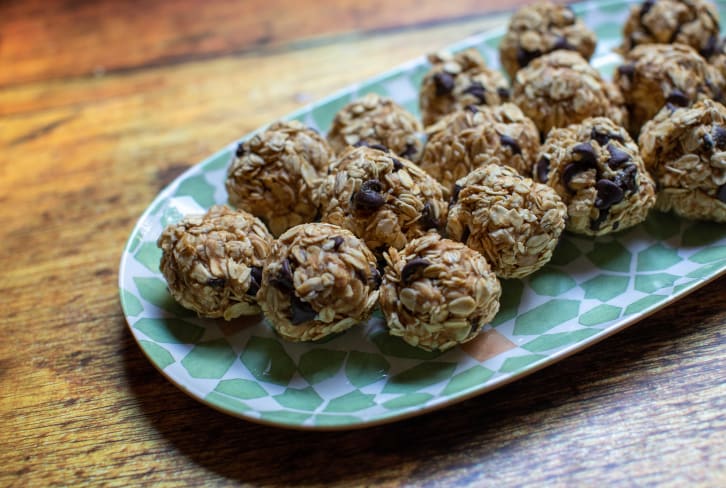Advertisement
These Are The Father Of Functional Medicine's 5 Go-To Plant-Based Foods


When you visualize functional medicine, images of biohacking, paleo snacking, and a fair share of avocados may come to mind. While the field of functional medicine remains complex (and there's no right path in terms of nutrition—it's all about what works for your own body), for Jeffrey S. Bland, Ph.D., FACN, CNS, the mantra is quite simple: Eat more plants.
It only makes sense that the father of functional medicine would place such an emphasis on plant-based nutrients. "If we go back to the cultures that have respected longevity and ask what they ate, we find that they're eating very hearty plants," he tells me on this episode of the mindbodygreen podcast. (And with respect to the Blue Zones, it seems he's not wrong).
Even more-so, Bland says there are some better-for-you nutrients you just can't get in animal products: phytochemicals. You know, those compounds that help protect plants from diseases (and can do the same in our bodies). Here are some of Bland's favorite plant-based foods, featuring a host of phytochemicals and plenty of other gut-healthy benefits. (Hint: You may be surprised by a few of his go-to's!)
Artichokes
"Artichokes are known to be very, very high in soluble prebiotics," Bland says. Meaning, they help feed your friendly gut bacteria and help them proliferate on their own (as opposed to a probiotic, which replenishes your microbiome with healthy bacteria). Because artichokes are a Mediterranean diet staple, it's no secret why they are the star of many dietitians' plates. One can of artichoke hearts has 5 grams of fiber and 3 grams of protein, making it a great plant-based option for you to have on-hand.
Cruciferous vegetables
Cruciferous veggies have long been touted for their gut-healthy properties. Rather than picking a few favorites, Bland says the cruciferous vegetable family as a whole (some key players include kale, cauliflower, Brussels sprouts, and broccoli) are incredibly nutrient-rich.
"They not only have glucosinolates, but they also have interesting prebiotic fiber," he says. As with artichokes, the prebiotic fiber in cruciferous veggies can feed the "bugs" in our gut and keep it happy.
But the glucosinolates are perhaps what makes Bland such a fan: Glucosinolates can produce anti-carcinogenic compounds that have been found to protect DNA, inhibit tumor formation, and trigger antioxidant activity1. If you needed another reason to dive into a cauliflower pizza recipe, let this be a sign.
Oats
Bland loves a good bowl of oatmeal. "Oats have a lot of beta-glucan, which is a really important modulator of your microbiome," he says. (Another benefit: Beta-glucans can help lower cholesterol and improve heart health!).
Oats also have their own profile of phenols and antioxidant properties. Some of note, according to one systematic review include vitamin E, phytic acid, phenolic compounds, and avenanthramides2, which can help reduce inflammation.
Tartary buckwheat
Before you check your pantry, you should know that this isn't your ordinary buckwheat. Tartary buckwheat is actually a plant crop that's actually not wheat at all. "It's called buckwheat, but it's not wheat. It has no gluten," says Bland.
Rather, "It has 100 times higher levels of stress-fighting phytochemicals than in any other plant food," he explains.
While tartary buckwheat was common in early colonial America, there are only 20 acres of tartary buckwheat grown in the United States today. Why? "It's so high in phytochemicals that it's quite bitter."
Before you get too bummed, know that Bland is working on getting this extra-special buckwheat to the masses: "Over the next 5 years we're going to help small farms grow 20,000 acres of tartary buckwheat because we think it's the next superfood."
Beer (yes, really)
While red wine seems to get all the praise these days, Bland says people tend to overlook the benefits of beer.
"Beer has hops in it," he says. "Hops are not only a bittering agent, but they are a bioactive member of the phytochemical families that stimulate insulin sensitivity and cause lipid metabolism."
There's research to back it up, too: One review of existing medical data found that the compounds in hops can ward off some disease processes, particularly those related to metabolic syndrome.
In terms of which beer to opt for, Bland says the bitter, the better. "Go for an IPA, because you have more of those isoflavones and humulones from the hops." (Those are two of the good-for-you compounds). If you're partial to an amber, that's fine, too. Anything that has a higher IBU in it will give you those hops benefits, says Bland.
However, he emphasizes that doesn't give you the go-ahead to start guzzling buckets of beer. "Just as with wine or with tequila, it has to do with magnitude," he says. Like many other experts in the field, the father of functional medicine is a huge proponent of balance. Very on-brand for Bland.
Whether you're trying to eat more plant-based foods or simply choosing which staples to stock up on, keep Bland's five superstars in mind the next time you're curating your grocery list. They might be simple, but they pack quite a healthy punch.
Watch Next
Enjoy some of our favorite clips from classes
Enjoy some of our favorite clips from classes
What Is Meditation?
Mindfulness/Spirituality | Light Watkins
Box Breathing
Mindfulness/Spirituality | Gwen Dittmar
What Breathwork Can Address
Mindfulness/Spirituality | Gwen Dittmar
The 8 Limbs of Yoga - What is Asana?
Yoga | Caley Alyssa
Two Standing Postures to Open Up Tight Hips
Yoga | Caley Alyssa
How Plants Can Optimize Athletic Performance
Nutrition | Rich Roll
What to Eat Before a Workout
Nutrition | Rich Roll
How Ayurveda Helps Us Navigate Modern Life
Nutrition | Sahara Rose
Messages About Love & Relationships
Love & Relationships | Esther Perel
Love Languages
Love & Relationships | Esther Perel
What Is Meditation?
Box Breathing
What Breathwork Can Address
The 8 Limbs of Yoga - What is Asana?
Two Standing Postures to Open Up Tight Hips
How Plants Can Optimize Athletic Performance
What to Eat Before a Workout
How Ayurveda Helps Us Navigate Modern Life
Messages About Love & Relationships
Love Languages
Advertisement

These Peanut Butter Cup Protein Bites Make The Perfect On-The-Go Snack
Molly Knudsen, M.S., RDN










